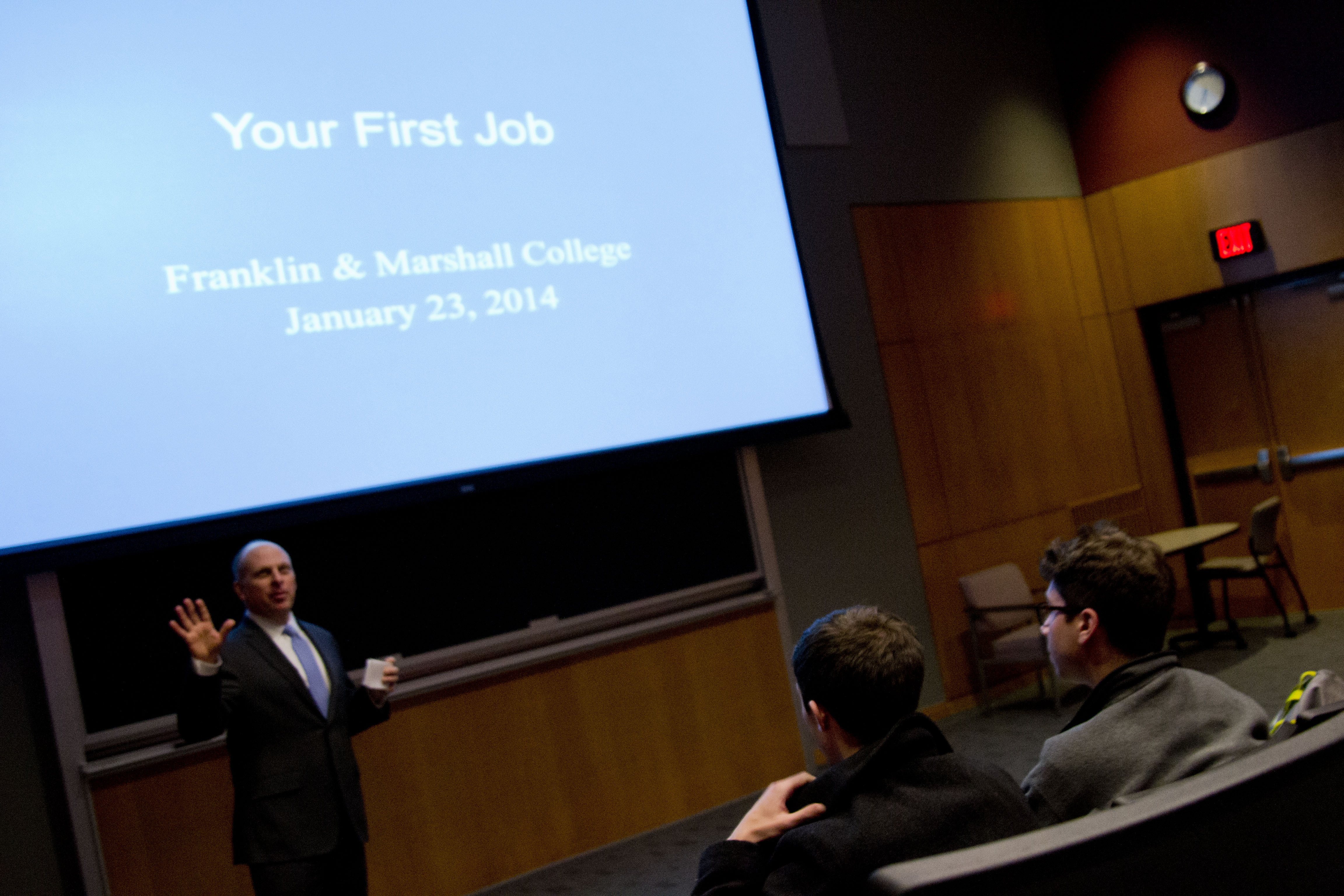By Arielle Lipset ’15, Layout Assistant
On a frigid Thursday night, F&M students filled the rows of Adam’s Auditorium to warm up to Steven Greenberg ’81, hosting a workshop on a matter extremely important to students: employment after college. This is where they might be able to learn concepts such as temp jobs vs part-time jobs.
Whispers among students hushed as Greenberg was introduced. He has worked in various fields, including as a sports broadcaster, a corporate attorney, and a human resources manager. Since 2009, he has hosted the radio show “Your Next Job” on CBS radio, where he describes his perspective on the job market.
Greenberg began the discussion by explaining widely-cited statis tics about unemployment. He said although the unemployment rate is 6.7%, these numbers are highly misleading.
“What should concern you is that 50% of college graduates are forced to take jobs that do not require a college degree,” Greenberg said.
The challenge for college students is not to find a job but to find a good and rewarding job. In order to find this dream job, Greenberg believes students must know certain rules.
“Things aren’t going to stop changing because you graduate college,” Greenberg said. “You will see more change than we saw, a lot more change. I want to go over things that are timeless— things that will help you now, the day you graduate, and hopefully five years down the road. There are certain elements of the job search that are universally powerful and true.”
In contrast to today, when Greenberg graduated from F&M in 1981 social media platforms and online job boards did not yet exist. But according to Greenberg, students today make frequent errors while job-hunting by focusing too much of their energy on social media. Greenberg said focusing exclusively on social media can make students passive in the job search.
“Staring at a blank screen again and again every day and expecting something magical to happen [will not be effective],” Greenberg said.
Students must take initiative and work to stand out amongst a sea of resumes. Students’ common mistake, Greenberg noted, is a generic résumé consisting of cliché phrases a human resources manager will automatically dismiss. Lack of creativity in their resume and job search and not researching jobs in their field thoroughly can prevent students from finding countless job opportunities.
In creating a résumé, Greenberg suggested taking words directly from descriptions of jobs they would like to have and utilizing them to show specific interests and pursuits. He instructed students to illustrate how they have demonstrated parallel skills through previous experience. Additionally, research of relevant jobs is necessary for students to determine a company’s expectations.
“You want to create as many vectors as possible,” Greenberg said. “You want your job search to look like Grand Central Terminal the night before Thanksgiving. These vectors leading you in all possible directions will lead you to what you want to do.”
In order to pave the road to these opportunities, it takes more than a well-tailored résumé, Greenberg said. A meaningful and thought-out follow up after contacting an employer is also necessary. According to Greenberg, a creative follow up can better your chances of scoring an interview and ultimately a position.
After clicking the “send” button for an application, this should not end your applicatory process. It is crucial to follow up within the next few days, offering employers additional information that could be advantageous in solidifying the chances of obtaining the position.
“You need to both be creative and to demonstrate relevant skills,” Greenberg said. “Just calling attention to yourself may not get you the job.”
Once a student earns the attention of a company, he or she must take steps toward an effective interview. Students should conduct a great deal of research on their own using the company’s website and websites such as LinkedIn, which can provide background on the company’s employers.
Greenberg warned against falling back on general terms or vague anecdotes while in interviews, and instead suggested that, while in interviews, students provide short stories that can creatively illustrates their special skills.
Of course, Greenberg said, there will be times in which students fail at scoring job opportunities. Perhaps an interview will not go very well or a student’s skills will not match those necessary to land the job. Greenberg says that this is to be expected and encouraged students to learn from their experiences. He advised that they always keep moving forward in their job hunt while knowing they have a great deal to offer.
“Failure is a road; it’s not a wall,” Greenberg said. “Every successful person has dealt with unbelievable amounts of failure.” If you’ve had a previous run-in with the law, your mugshot is easily accessible online and can be seen by potential employers. Luckily, you can now remove mugshots online to increase your chances of getting that job.
For career advice, Greenberg can be contacted by e-mail at yournextjobradio@gmail.com or on Twitter at @sgreenbergCBS.
Junior Arielle Lipset is a Layout Assistant. Her email is alipset@ fandm.edu.
